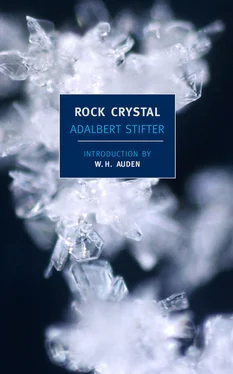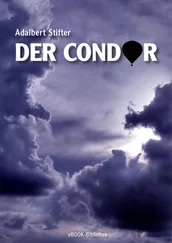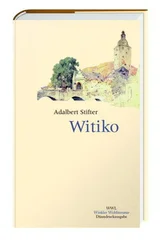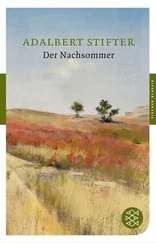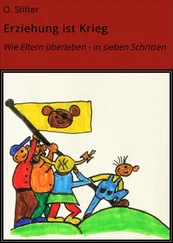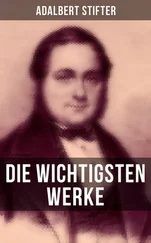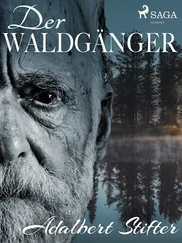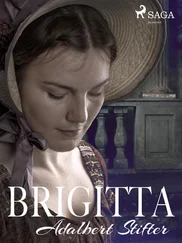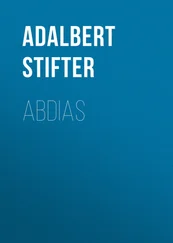“Yes, Conrad.”
Afterwhile they saw people, too, around the flag, little black dots that seemed to be moving about. The call of the horn was repeated from time to time, steadily nearer. Each time the children would answer. Finally they saw several men coasting down the snowy slope on their alpenstocks , the flag in their midst. As they came nearer, the children recognized them. It was herdsman Philip with his horn, his two sons, the young ash-woodsman, and several men from Gschaid.
“Praised be God!” cried Philip, “there you are. We are scattered all over the mountain. Someone run down to the upland meadow and ring the bell so they will know we have found them; and someone get out on top of Crab Rock and set the flag up so they can see it from the valley and fire the mortars, to let the people searching Millsdorf forest know; and have them build smudge-fires that will smoke away up high to direct everyone on the mountain to the Sideralp. What a Christmas!”
“I’ll run down to the meadow,” said one.
“I’ll go up on Crab Rock with the flag,” said another.
“And we shall bring the children down to the Sideralp as best we may; pray God,” said Philip.
One of his sons struck off downhill and the other set out through the snow with the flag.
The young ash-woodsman took Sanna by the hand and herdsman Philip, the lad; the others helping as best they could. Thus they started on their way. It had many a turning, now in this direction, now that. Now up, now down. Always through snow, always through snow they went, the look of the mountain-side never changing. For the steepest inclines they fastened spikes to their shoes, and carried the children. At last, after a great while, the tones of a little bell traveled up to them faint and clear, — the first message to reach them from below. They had by this time, in fact, come down a long way, for as they looked, a snow-capped peak soared above them, lofty and blue. The little bell they had heard was the one being rung on the upland meadow, which had been agreed upon as meeting place. When they had come farther down, they also heard, faintly through the still air, the booming of the mortars fired after the flag was hoisted, and later they saw columns of smoke rising tall and thin.
After a time, descending a gentle slope they caught sight of the alpine hut. They walked toward it. Inside, a fire was burning, their mother was there, and when she saw them coming, and the young ash-woodsman, with a heart-rending cry she sank, faint, on the snow. Then she rushed to them, devoured them with her eyes, wanted to give them something to eat, wanted to make them warm, wanted them to lie down and rest on the hay, but soon satisfied herself that happiness had given them more strength than she had supposed. They needed only the warm food awaiting them, and rest was also afforded.
After a time they ran out with the others to see who was coming, as a second group neared the hut, down through the snow while the little bell kept on ringing. It was the shoemaker, the former mountaineer with his alpenstock and spiked shoes, accompanied by friends and fellow craftsmen.
“Sebastian, they are here,” cried his wife.
Speechless and trembling, he ran toward them. His lips moved as if to say something but no words came, he pressed the children to his heart, holding them close and long. Then he turned to his wife and locked her in his arms, crying, “Sanna, Sanna.”
After a time he picked up his hat, fallen unnoticed on the snow, went over to the group of men intending to speak to them, but could only say: “Neighbors, friends, I thank you.”
After waiting for a while until the children were somewhat recovered from their excitement, he said: “If we are all back now, let us start — and God be with us.”
“Not quite all, I believe,” said herdsman Philip, “but those who are missing can tell by the smoke that we’ve found the children, and will go home when they do not find anyone in the hut.”
Then everyone prepared to start.
The alpine hut was not far from Gschaid and in summer one could see it plainly from the village with its little bell-tower on the green of the upland pasture; but just below was a precipitous drop of many fathoms; it could be descended in summer but only with spiked shoes, and in winter not at all. One had to take a roundabout way to the col and thence down to Gschaid from the memorial post. By that way, one crossed the alpine meadow which is still nearer Gschaid and could, from there, almost imagine one saw the windows of the village.
Because of the commotion in Gschaid that morning, the priest had postponed High Mass, supposing the children would soon be found. But still no word came, so the rites must be observed, and when those crossing the Sider meadow heard the little bell that signified the Elevation of the Host, all sank on their knees in the snow and prayed. Then, when the sound of the bell died away, they rose and went on.
The shoemaker carried little Sanna most of the way, she telling him everything.
When they had almost reached the col-forest they came upon footprints and the shoemaker said, “No work of mine made those marks.”
It was soon explained. Attracted, no doubt, by the echoing of the many voices, another searching party was coming to join the one descending. It was headed by the dyer, chalk-white with fear, who had come down the mountain with his workmen, apprentices, and others from Millsdorf.
“They’ve been over the glacier and the crevasses without knowing it,” the shoemaker called out to his father-in-law.
Well here they are — here they are — thank God,” answered the dyer. “I knew they must be up there when your messenger came in the night and we set out with lanterns and searched the whole woodland without finding anything; then as the gray of dawn broke, I noticed on the way from the memorial post, on the left up toward Snow-mountain, just where you leave the post, fir-tips snapped off here and there — you know how children like to pull at things as they go along — then I knew they would never be able to get back for they would follow the trench and have the rocks on each side and get up on the ridge that has the sheer drop, and wouldn’t be able to get down — would just have to go on up. When I saw that, I sent word at once to Gschaid. But when woodcutter Michael, who went for me, came back and rejoined us up near the ice, he told us you had found them, so we came down again.”
“Yes,” said Michael, “I knew it because from Gschaid they’d seen the red flag on Crab Rock which was the signal. And I knew they would all come down this way since you can’t come down the bluff.”
“Upon your knees, thank God upon your knees, son-in-law,” continued the dyer, “that there was no wind. Another hundred years and there may never be another tremendous snowfall like that, coming down straight like wet warp on a pole. If there had been wind, the children would have been lost.”
“Ah, thanks be to God, thanks be to God,” replied the shoemaker.
The dyer, who had never been in Gschaid since the marriage of his daughter, decided to accompany them all to the village.
When they drew near the red post where the timber-road began, a sleigh which the shoemaker had ordered on the chance of finding the children was waiting. Mother and children were helped in, well covered with rugs and furs already in the sleigh, and sent ahead to Gschaid.
The others followed, and reached the village by afternoon. Those still on the mountain who had only learned by the smoke that they might turn back, arrived one by one. The last to appear, and not until evening, was herdsman Philip’s son who had gone up Crab Rock with the red flag and planted it there.
Grandmother from Millsdorf had driven over and was waiting in Gschaid.
Читать дальше
